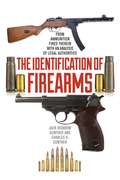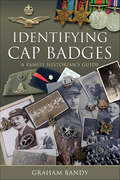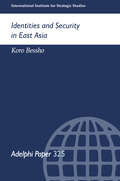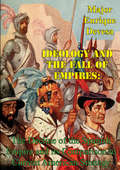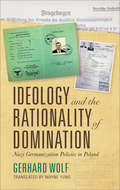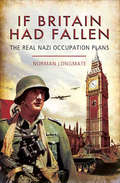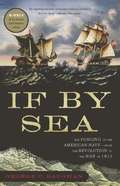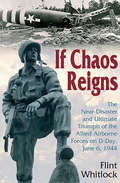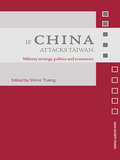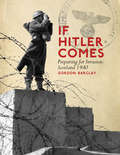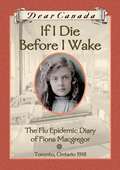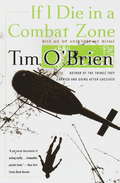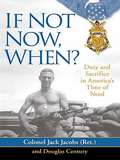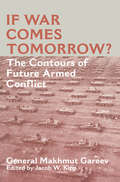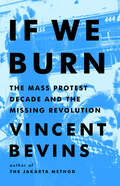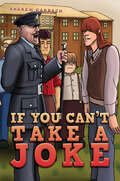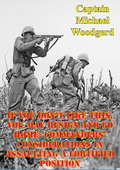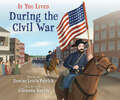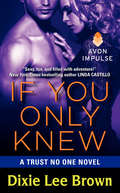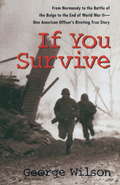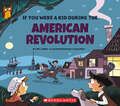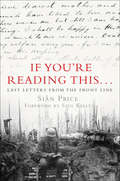- Table View
- List View
Identification of Firearms: From Ammunition Fired Therein With an Analysis of Legal Authorities
by Jack Gunther Charles GuntherThe 1930s was a decade that provided impressive breakthroughs in the field of forensic ballistics, or firearms identification. Following the St. Valentine’s Day Massacre of 1929, where ballistic expert Calvin Goddard’s testimony brought attention to the relatively new field, several forensic ballistic books were published. Among these were Burrard’s The Identification of Firearms and Forensic Ballistics and Hatcher’s Textbook of Firearms Investigations, Identification, and Evidence. Burrard introduced forensic examination to the British judicial system; Hatcher applied his considerable knowledge of firearms and ammunition to weapons’ design, manufacture, and testing. Gunthers’ The Identification of Firearms combined the approaches of these volumes into a new book that emphasized both the painstaking scientific methodology vital to firearms identification, complete with ballistics photographs, and its practical use by analyses of several legal cases where firearms identification was used. These include the infamous Sacco-Vanzetti case, the first in American legal history where forensic ballistics played a very prominent role in courtroom proceedings. The Gunther brothers utilized their respective legal and military experience to provide a comprehensive reference volume that is noteworthy for those interested in law enforcement or ballistics as well as gun enthusiasts.
Identifying Cap Badges: A Family Historian's Guide
by Graham BandyThis book is an invaluable ‘tool of the trade’ for anyone trying to identify or interpret photos. – Peter Hart, Military Historian Identifying Cap Badges is the book that has been missing from the bookshelves of family historians, military enthusiasts, and badge collectors alike. It is quite easy to find an erudite book on military cap badges, but you could spend hours, if not days, plodding through hundreds of pictures to find a match for the one you hold. Sometimes you may not find it at all! These learned badge collector's books have one major flaw; they are pictured and discussed in 'order of precedence', that is to say, from the earliest formed regiments to the latest, with separate sections on medical, engineers, cavalry, infantry, etc. This can be most confusing to those uninitiated into the 'dark arts' of military badges. Thus, if you do not know the name or 'original number' of your regiment in this order of precedence, you can be flummoxed! This, combined with all the different crowns, laurels, animals, mythological beasts and castles, can prove more than a little daunting, even to ex soldiers themselves! In this book you will find badges ordered by what is on the badge itself; be it a dragon, sphinx or castle, horse, lion or tiger. This is badge identification in minutes, rather than hours, with added information on dating badges and many comparison photographs alongside all the pictures of the badges. Added to these pictures are short histories of the regiments and 'family trees' plotting the antecedents of today's units.
Identities and Security in East Asia (Adelphi series #325)
by Koro BesshoEast Asia has been relatively free from large-scale conflict in the 1990s, but the absence of security organisations or even of a sense of community within the region has raised doubts about its future security. China and Japan are likely to bear much of the responsibility for maintaining stability, but both countries have been reluctant to adopt a leadership role. South-east Asian states have been willing to take the initiative outside of their sub-region, but they possess neither the resources nor the authority to lead the whole of East Asia. In the long term, the ability to organise the region depends on greater clarity in the identity of leading states in the region, and of the region as a whole. This paper analyses the way in which issues of identity have affected the actions of the key players, and assesses future challenges and possibilities in the search for regional security. It concludes that: Through the Association of South-East Asian Nations (ASEAN), South-east Asian states have developed a sense of confidence and unity. However, ASEAN’s need to safeguard its newly acquired identity means that it has not exported the ‘ASEAN way’ to the wider region of East Asia or the Asia-Pacific. The greater diversity that enlargement will bring and the effects of the crisis since 1997 are likely to make the Association’s defensive instincts still more resistant to change. In the 1990s, Japan has sought to redefine its identity, both in terms of its past and of its post-war values such as pacifism and human rights. This process has compelled Japan to face Asia more squarely, and has increased the country’s self-assurance. As a result, it may become more willing to take the initiative in political and security, as well as economic, areas. For China, nationalism has become more important, just as communism’s position as the country’s unifying ideology has eroded. Beijing has tried to change the status quo in a forceful way. By the close of the 1990s, however, China has become increasingly willing to act as a responsible world power. A key test of this transformation will be Beijing’s treatment of the Taiwan question. The prospects for regional stability depend on Japan’s ability to reform and return to growth. The most pressing task is to revitalise East Asia’s economies. A return to prosperity would encourage China’s reform and opening process; lessen Japan’s introspection; make disagreements between the South-east Asian states less acute; and allow the Asia-Pacific region as a whole to move beyond both the triumphalism of the East Pacific and the resentment of the West.
Ideology And The Fall Of Empires: The Decline Of The Spanish Empire And Its Comparison To Current American Strategy
by Major Enrique Gomariz DevesaSometimes, the ideology that formed the basis for founding an empire can become the cause of its fall. The decline of the Spanish Empire is a clear example of how ideology may both adversely influence national grand strategies and trigger processes of decline of an empire. The strong religious conviction of the Habsburgs was a fundamental factor in defining an imperial strategy that did not conform to the genuine interests of Spain as the core of the Empire. This strategy did not take into account limited Spanish capabilities that were not enough to achieve its religious goals.The purpose of this research is not to analyze in depth how religion influenced the decline of the Spanish Empire, but to use this process to establish a paradigm to explain how ideologies can become a negative influence on national policies. Once the paradigm is established, it will be compared to a similar process to develop some valid conclusions regarding the importance of defining national strategic objectives according to the interests and capabilities of each state.Over the last two decades, the desire to expand and promote democracy around the world became the dominant ideology in the United States. Therefore, its influence in the evolution of recent American national strategies serves as a valid comparison. This study presents some conclusions that not only might be applicable for the analysis and study of national strategies, but also may help to understand how and when ideologies that may be necessary to maintain the cohesion of nations and empires, can became a source of national decline.
Ideology and the Rationality of Domination: Nazi Germanization Policies in Poland
by Gerhard WolfThis &“well-researched, clear [and] convincing&” historical study examines the ideology and politics of Germanization during the WWII occupation of Poland (Nicholas Stargardt, author of The German War). Following the brutal invasion and occupation of Poland, the Nazis moved swiftly to realize one of their key ideological aims: the expansion of German living space. This involved deporting Jews, bringing in German settlers, and establishing an evaluation process that separated Poles from ethnic Germans. As simple as this might have seemed initially, the various parts of the German occupation machinery were soon embroiled in a bitter fight about the essence of Germanness and how to identify a German. In this illuminating study, Gerhard Wolf reveals an astonishing development in which a more inclusive understanding of Germanness based on the notion of Volk won out against an exclusive definition based on Rasse. As Wolf demonstrates, this decision paved the way for turning three million Poles into German citizens. Parallel to the mass deportation and murder of Christian Poles and the genocide of Jewish Poles, the Nazis paradoxically also presided over the largest (forced) assimilation program in German history. Students and scholars of the Second World War, the Holocaust, and Nazism will find new analysis of German imperialism, ethnic cleansing, and genocide in this important book.
If Britain Had Fallen: The Real Nazi Occupation Plans (Greenhill Military Paperbacks)
by Norman LongmateWhat if Germany had invaded the British Isles? &“A distinguished contribution to the canon of alternate histories&” (Military History). If Britain Had Fallen is a fascinating contemplation of what it would have been like for Britain to live day to day under Nazi occupation. It discusses every phase of the scenario, from the German pre-invasion maneuvering and preparations, to the landing of troops, to the German seizure of power. What would have happened to the king and the government? Would America, Canada, or Australia have come to the rescue? Would the British people have grown to accept the occupation? Would the deportation of friends and the flying of the swastika from Buckingham Palace incite passive compliance, or brave resistance? All these questions and more are explored in this thought-provoking and chilling pastiche of the twentieth century&’s most enduring and darkest episodes. Based on a classic television film of the same name, this book includes illustrations and an updated foreword by military historian Norman Longmate.
If By Sea: The Forging of the American Navy--from the Revolution to the War of 1812
by George C. DaughanThe American Revolution-and thus the history of the United States-began not on land but on the sea. Paul Revere began his famous midnight ride not by jumping on a horse, but by scrambling into a skiff with two other brave patriots to cross Boston Harbor to Charlestown. Revere and his companions rowed with muffled oars to avoid capture by the British warships closely guarding the harbor. As they paddled silently, Revere’s neighbor was flashing two lanterns from the belfry of Old North Church, signaling patriots in Charlestown that the redcoats were crossing the Charles River in longboats. In every major Revolutionary battle thereafter the sea would play a vital, if historically neglected, role. When the American colonies took up arms against Great Britain, they were confronting the greatest sea-power of the age. And it was during the War of Independence that the American Navy was born. But following the British naval model proved crushingly expensive, and the Founding Fathers fought viciously for decades over whether or not the fledgling republic truly needed a deep-water fleet. The debate ended only when the Federal Navy proved indispensable during the War of 1812. Drawing on decades of prodigious research, historian George C. Daughan chronicles the embattled origins of the U. S. Navy. From the bloody and gunpowder-drenched battles fought by American sailors on lakes and high seas to the fierce rhetorical combat waged by the Founders in Congress, If By Sea charts the course by which the Navy became a vital and celebrated American institution.
If Chaos Reigns: The Near-Disaster and Ultimate Triumph of the Allied Airborne Forces on D-Day, June 6, 1944
by Flint Whitlock&“A gem of a book that highlights the &‘fog of war&’ as seen by American, British, and Canadian airborne units when they parachuted behind enemy lines.&” —WWII HistoryMagazine &“Gentlemen, do not be daunted if chaos reigns; it undoubtedly will.&” So said Brigadier S. James Hill, commanding officer of the British 3rd Parachute Brigade, in an address to his troops shortly before the launching of Operation Overlord—the D-Day invasion of Normandy. No more prophetic words were ever spoken, for chaos indeed reigned on that day, and many more that followed. Much has been written about the Allied invasion of France, but award-winning military historian Flint Whitlock has put together a unique package—the first history of the assault that concentrates exclusively on the activities of the American, British, and Canadian airborne forces that descended upon Normandy in the dark, pre-dawn hours of June 6, 1944. Landing into the midst of the unknown, the airborne troops found themselves fighting for their lives on every side in the very jaws of the German defenses, while striving to seize their own key objectives in advance of their seaborne comrades to come. Whitlock details the formation, recruitment, training, and deployment of the Allies&’ parachute and glider troops. First-person accounts by veterans who were there—from paratroopers to glidermen to the pilots who flew them into the battle, as well as the commanders (Eisenhower, Taylor, Ridgway, Gavin, and more)—make for compelling, &“you-are-there&” reading. If Chaos Reigns is a fitting tribute to the men who rode the wind into battle and managed to pull victory out of confusion, chaos, and almost certain defeat.
If China Attacks Taiwan: Military Strategy, Politics and Economics (Asian Security Studies)
by Steve TsangThis is a new analysis of the key issues facing Chinese policy makers in their approach towards Taiwan. This is one of the most tense and potentially explosive relationships in world politics. This book explains succinctly the impetus, the methods and the consequences if China is to use force, a prospect that has become greater following the return of President Chen Shui-bian to power in Taiwan for a second term in 2004. If China Attacks Taiwan shows how in reality there can be no real winner in such an eventuality and how the consequences would be dire not just for Taiwan and China, but East Asia as a whole. Whether China will use force depends ultimately on how its policy making apparatus assess potential US intervention, whether its armed forces can subdue Taiwan and counter US military involvement, as well as on its assessment of the likely consequences. Given the extremely high probability of American involvement this volume appeals to not only scholars and students working on China, its foreign policy and the security and prosperity of East Asia, but also to policy makers and journalists interested in China’s rise and its defense policy, Taiwan’s security and development, regional stability as well as US policy toward China and the East Asia region generally. This book is essential for understanding China’s efforts to achieve a ‘peaceful rise’, which requires it to transform itself into a global power not by the actual use of force but by diplomacy backed up by rapidly expanding military power. This book is an excellent resource for all students and scholars of military and security studies, Asian (China/Taiwan) studies and international relations
If Hitler Comes: Preparing for Invasion: Scotland 1940
by Gordon BarclayThe first book to provide a comprehensive account of the anti-invasion defenses built in Scotland during World War II. Between May 1940 and the summer of 1941, the British people expected a German invasion that, had it succeeded, would have enslaved them into the Nazis&’ racist war. This period saw an unparalleled effort to prepare the defense of the UK against invasion. Scotland&’s nationally important heavy industries, vital Royal Navy bases, and one of the UK&’s key ports, were very vulnerable to the sort of airborne attack that had devastated the defenses of Belgium. Everyone was certain that a Fifth Column of Nazi sympathizers and agents was working actively to spread rumors and despair, and to aid the invasion forces, and in reality, the country was far from united. Although the 1939-45 War is the most written-about war in history there is no account of the heroic efforts made in those months to prepare Scotland for the inevitable invasion, and how the defenses were intended to be used. This book tells that story, against the wider history of the period and its people, and describes what was built, and what now survives.&“The book details transportation infrastructure and the construction of military bases and various structures and barriers, concentrating on defense efforts on coastal beaches and harbors. The study explores shows how defense plans changed in response to shifts in defense policy and the misconceptions of those planning the defenses, including misunderstanding of German military strategies. B&W historical and contemporary photos and maps are included.&” —ProtoView
If I Die Before I Wake: The Flu Epidemic Diary of Fiona Macgregor, Toronto, Ontario, 1918
by Jean LittleFiona comes from a large and loving family where she, her older sisters and her mother are all twins. But soon her loving family is torn apart as the Spanish flu is brought to Canada by soldiers returning from fighting overseas in World War I. Fiona turns to her diary, pouring out her fears as her sisters fall ill with the deadly disease. Will Fee lose those dear to her?
If I Die in a Combat Zone: Box Me Up and Ship Me Home
by Tim O'BrienA classic from the New York Times bestselling author of The Things They Carried "One of the best, most disturbing, and most powerful books about the shame that was / is Vietnam."—Minneapolis Star and TribuneBefore writing his award-winning Going After Cacciato, Tim O'Brien gave us this intensely personal account of his year as a foot soldier in Vietnam. The author takes us with him to experience combat from behind an infantryman's rifle, to walk the minefields of My Lai, to crawl into the ghostly tunnels, and to explore the ambiguities of manhood and morality in a war gone terribly wrong. Beautifully written and searingly heartfelt, If I Die in a Combat Zone is a masterwork of its genre.Now with Extra Libris material, including a reader&’s guide and bonus content.
If Not Now, When?: Duty and Sacrifice in America's Time of Need
by Douglas Century Colonel Jack JacobsA Medal of Honor recipient looks back at his own service?and ahead to America?s future. Jack Jacobs was acting as an advisor to the South Vietnamese when he and his men came under devastating attack. Wounded, 1st Lt. Jacobs took command and withdrew the unit, returning again and again, saving fourteen lives?for which he received the Medal of Honor. Here, Col. Jacobs tells his stirring story of heroism, honor, and the personal code by which he has lived his life, and expounds with blunt honesty and insight his views on our contemporary world, and the nature and necessity of sacrifice. If Not Now, When? is a compelling account of a unique life at both war and peace, and the all-too-often unexamined role of the citizenry in the service and defense of the Republic.
If War Comes Tomorrow?: The Contours of Future Armed Conflict (Soviet (Russian) Military Theory and Practice #No. 7)
by General Makhmut GareevMilitary affairs have been affected by major changes in recent years. The bipolar world of two superpowers has gone. The Cold War and the global military confrontation that accompanied it have ended. A new military and political order has emerged in the world, but the world has not become more stable; indeed, wars and armed conflict have become much more common.Forecasting the contours of future armed conflict is no easy task at such times, but this is the primary objective of If War Comes Tomorrow? Focusing on the impact of new technologies, General Gareev considers whether war is still a continuation of politics by other means' or whether the political, ideological, and technical transformation have broken that connection. He explores the linkage between threats to Russian national interests and war as an instrument of policy in great detail and concludes that there is very little prospect either of nuclear war or widespread conventional war. However, he does see local armed conflicts and local wars increasing, with greater emphasis on subversion. He argues that coming decades will see a shift towards a reliance upon indirect means to accomplish limited political ends, and analyses both information warfare and the revolution in military affairs from this perspective.
If We Burn: The Mass Protest Decade and the Missing Revolution
by Vincent BevinsThe story of the recent uprisings that sought to change the world - and what comes next From 2010 to 2020, more people participated in protests than at any other point in human history. Yet we are not living in more just and democratic societies as a result. IF WE BURN is a stirring work of history built around a single, vital question: How did so many mass protests lead to the opposite of what they asked for? From the so-called Arab Spring to Gezi Park in Turkey, from Ukraine&’s Euromaidan to student rebellions in Chile and Hong Kong, acclaimed journalist Vincent Bevins provides a blow-by-blow account of street movements and their consequences, recounted in gripping detail. He draws on four years of research and hundreds of interviews conducted around the world, as well as his own strange experiences in Brazil, where a progressive-led protest explosion led to an extreme-right government that torched the Amazon. Careful investigation reveals that conventional wisdom on revolutionary change is gravely misguided. In this groundbreaking study of an extraordinary chain of events, protesters and major actors look back on successes and defeats, offering urgent lessons for the future.
If You Can't Take a Joke
by Andrew DarrochThe gates of RAF Swinderby were the entrance to an alien world in the eyes of a young man with no previous military experience, and arrival there came as a shock to the senses; a shock which the instructors did their level best to maximise, by giving every instruction and making every observation in an ear-splitting shriek that could melt earwax. From dawn until dusk there was no respite as a host of alien concepts were hammered into us from a variety of different sources, nor from dusk until midnight when we would be cleaning every nook and cranny of our barrack block until everything gleamed, although it never seemed to be shiny enough for the corporal or the sergeant. Gradually though, the unfamiliar became familiar as those alien concepts sank in and stopped being alien, as we learned and toughened up, becoming the best we thought we could be, and then exceeded that and started to become as good as the instructors thought we could be; until we really learned how to take a joke.
If You Don’t Like This, You May Resign And Go Home: Commanders’ Considerations In Assaulting A Fortified Position
by Captain Michael WoodgerdThe author studies the experiences of British, German, American and Soviet armies in assaults on fortified positions to find critical considerations for contemporary commanders. A fortified position is a series of mutually supporting areas comprising bunkers, pillboxes, weapons emplacements, entrenchments, wire, mines and other obstacles. Assaulting such a position held by determined defenders is a uniquely brutal and bloody event. The author systematically studies fighting at El Alamein, the Normandy Campaign, Okinawa, the Siegfried Line, Kursk, Manchuria and the Petsamo-Kirkenes area. Each battle is examined in terms of the use and importance of intelligence, smoke, armor, infantry, engineers, artillery, air support, C2 and special weapons. A portion of this study also examines current training at the U.S. Army's National Training Center to find if current training reflects battle proven techniques. The conclusion offers the author's recommendations to assist commanders and staffs in determining the organization, equipment, tactics, training and means of control of forces in the assault of a fortified position.
If You Go Away: A sweeping, romantic epic from the bestselling author of BOTH OF YOU
by Adele ParksThe war brought them together. And will tear them apart...Let No. 1 Sunday Times bestseller, Adele Parks, author of Just My Luck, sweep you away into a world of glamorous debutantes, heartbreak and discovering just what is worth fighting for in her stunning historical epic, If You Go Away.Don't miss Adele's gripping new novel, the Sunday Times bestseller Both of You, out now!'A real emotional treat' Daily Mail'Epic, romantic, devastating' Heat'Beautifully and surprisingly gritty' RedDaring debutante Vivian Foster has London society at her feet - all she needs is a proposal to complete her triumphant season. A moment's indiscretion causes her world to crumble, just as the country around her erupts into a devastating war. Everything seems bleak. Until she meets Howard.Celebrated playwright Howard Henderson wants no part in the killing of a faceless enemy, but refusing to fight will lead to imprisonment, even death. He wishes he could convey the depth of inhumanity he witnessed at the Front but the words won't come. Until he meets Vivian.Now they've found each other - and something worth fighting for.But will the war demand that sacrificing their future together is the only way to honour their love?What readers are saying about If You Go Away:'I was moved to tears repeatedly as this novel worked its magic on me. The writing is beautiful, deceptively light in places, harrowing and tragic in others. Adele Parks is a stunning storyteller''A must read and a truly wonderful tribute to war heroes and their wives'
If You Go Away: A sweeping, romantic epic from the bestselling author of BOTH OF YOU
by Adele ParksGlamorous debutantes, heartbreak and discovering just what is worth fighting for in the new historical novel from Sunday Times bestseller Adele Parks.1914. Vivian, a young, impassioned debutante is hurried into a pedestrian marriage to cover a scandal. War breaks out on her wedding day - domestically and across Europe. Quick to escape the disappointment of matrimony, her traditionalist husband immediately enlists and Vivian has no alternative than to take up the management and running of his estate - after all, everyone is required to do their bit. Even pretty, inadequately-educated young wives.Howard, a brilliant young playwright rushes to the front to see for himself the best and the worst of humanity; he cannot imagine what the horror might be. In March 1916, when conscription becomes law, it is no longer enough for him to report on the War, it's a legal requirement that he joins the ranks. Howard refuses, becoming one of the most notorious conscientious objectors of the time. Disarmingly handsome, famous, articulate and informed, he's a threat to the government. Narrowly escaping a death sentence by agreeing to take essential work on Vivian's farm, it's only then Howard understands what is worth fighting for.(P)2015 Headline Digital
If You Go Away: A sweeping, romantic epic from the bestselling author of JUST MY LUCK
by Adele ParksThe war brought them together. And will tear them apart...Let No. 1 Sunday Times bestseller, Adele Parks, author of Lies, Lies, Lies, sweep you away into a world of glamorous debutantes, heartbreak and discovering just what is worth fighting for in her stunning historical epic, If You Go Away.Don't miss Adele's gripping new novel, the No. 1 bestseller Just My Luck, out now!'A real emotional treat' Daily Mail'Epic, romantic, devastating' Heat'Beautifully and surprisingly gritty' RedDaring debutante Vivian Foster has London society at her feet - all she needs is a proposal to complete her triumphant season. A moment's indiscretion causes her world to crumble, just as the country around her erupts into a devastating war. Everything seems bleak. Until she meets Howard.Celebrated playwright Howard Henderson wants no part in the killing of a faceless enemy, but refusing to fight will lead to imprisonment, even death. He wishes he could convey the depth of inhumanity he witnessed at the Front but the words won't come. Until he meets Vivian.Now they've found each other - and something worth fighting for.But will the war demand that sacrificing their future together is the only way to honour their love?What readers are saying about If You Go Away:'I was moved to tears repeatedly as this novel worked its magic on me. The writing is beautiful, deceptively light in places, harrowing and tragic in others. Adele Parks is a stunning storyteller''A must read and a truly wonderful tribute to war heroes and their wives'
If You Lived During the Civil War (If You)
by Denise Lewis PatrickWhat do you know about the Civil War?What if you lived in a different time and place? What would you wear? What would you eat? How would your daily life be different?Scholastic's If You Lived... series answers all of kids' most important questions about events in American history. With a question and answer format, kid-friendly artwork, and engaging information, this series is the perfect partner for the classroom and for history-loving readers.What if you lived during the Civil War? Would you be allowed to be a soldier? How would you communicate? What is the true story of the battle between the states?Denise Lewis Patrick answers all these questions and more in this comprehensive guide to the Civil War. A great choice for Civil War units, and for teaching children about this important moment in American history.
If You Only Knew
by Dixie Lee BrownThe next sexy, suspenseful installment in Dixie Lee Brown's Trust No One series . . .Beautiful but deadly, Rayna Dugan is a force to be reckoned with--even in heels.But when her plans for the evening suddenly involve defending her life against a criminal empire, Rayna knows she needs backup. The choice she made to leave Ty and her old mercenary team in Montana starts to seem like a bad call. She's been running from her feelings for the tough, rugged man, but Rayna needs Ty now more than ever. Yet when Ty becomes the new target, his help could mean his death . . .Ex-cop Ty Whitlock has spent the last six years waiting for his past to catch up with him. When it finally does, he isn't expecting the woman he loves--the one who walked out on him--to be caught in its web. He knows she's moved on, but he can't help wanting another chance with the petite beauty. Ty's got only one choice: find Rayna and keep her safe. But that's the easy part. Once he finds her, can he convince her to stay?
If You Survive: From Normandy to the Battle of the Bulge to the End of World War II, One American Officer's Riveting True Story
by George Wilson"If you survive your first day, I'll promote you." So promised George Wilson's World War II commanding officer in the hedgerows of Normandy -- and it was to be a promise dramatically fulfilled. From July, 1944, to the closing days of the war, from the first penetration of the Siegfried Line to the Nazis' last desperate charge in the Battle of the Bulge, Wilson fought in the thickest of the action, helping take the small towns of northern France and Belgium building by building.Of all the men and officers who started out in Company F of the 4th Infantry Division with him, Wilson was the only one who finished. In the end, he felt not like a conqueror or a victor, but an exhausted survivor, left with nothing but his life -- and his emotions. If You Survive is one of the great first-person accounts of the making of a combat veteran, in the last, most violent months of World War II.
If You Were a Kid During the American Revolution (If You Were a Kid)
by Wil MaraGet a first hand look at the early days of the American Revolution.When British soldiers accuse Samuel Richardson's father and uncle of being rebellious Patriots, Samuel must work together with his cousin Molly to help the family make an escape. Readers (Ages 7-9) will follow along on the cousins' adventure as they witness the early days of the American Revolution and come up with a daring plan to save their fathers.
If You're Reading This . . .: Last Letters from the Front Line
by Siân PriceThree centuries of war. Three centuries of sacrifice. &“Tales of love and heroism from conflicts such as the Napoleonic Wars and Afghanistan today.&” —The Mirror In this brilliant and profoundly moving collection of farewell letters written by servicemen and women to their loved ones, Siân Price offers a remarkable insight into the hearts and minds of some of the soldiers, sailors and airmen of the past three hundred years. Each letter provides an enduring snapshot of an impossible moment in time when an individual stares death squarely in the face. Some were written or dictated as the person lay mortally wounded; many were written on the eve of a great charge or battle; others were written by soldiers who experienced premonitions of their death, or by kamikaze pilots and condemned prisoners. They write of the grim realities of battle, of daily hardships, of unquestioning patriotism or bitter regrets, of religious fervor or political disillusionment, of unrelenting optimism or sinking morale and above all, they write of their love for their family and the desire to return to them one day. Be it an epitaph dictated on a Napoleonic battlefield, a staunch, unsentimental letter written by a Victorian officer, or an email from a soldier in modern day Afghanistan, these voices speak eloquently and forcefully of the tragedy of war and answer that fundamental human need to say goodbye. &“The poignant farewells encapsulate the final words of servicemen to their loved ones before they were killed in action.&” —The Telegraph &“A timely reminder of the tremendous sacrifices made by fighting men and women of all countries in all ages.&” —Military History Monthly
